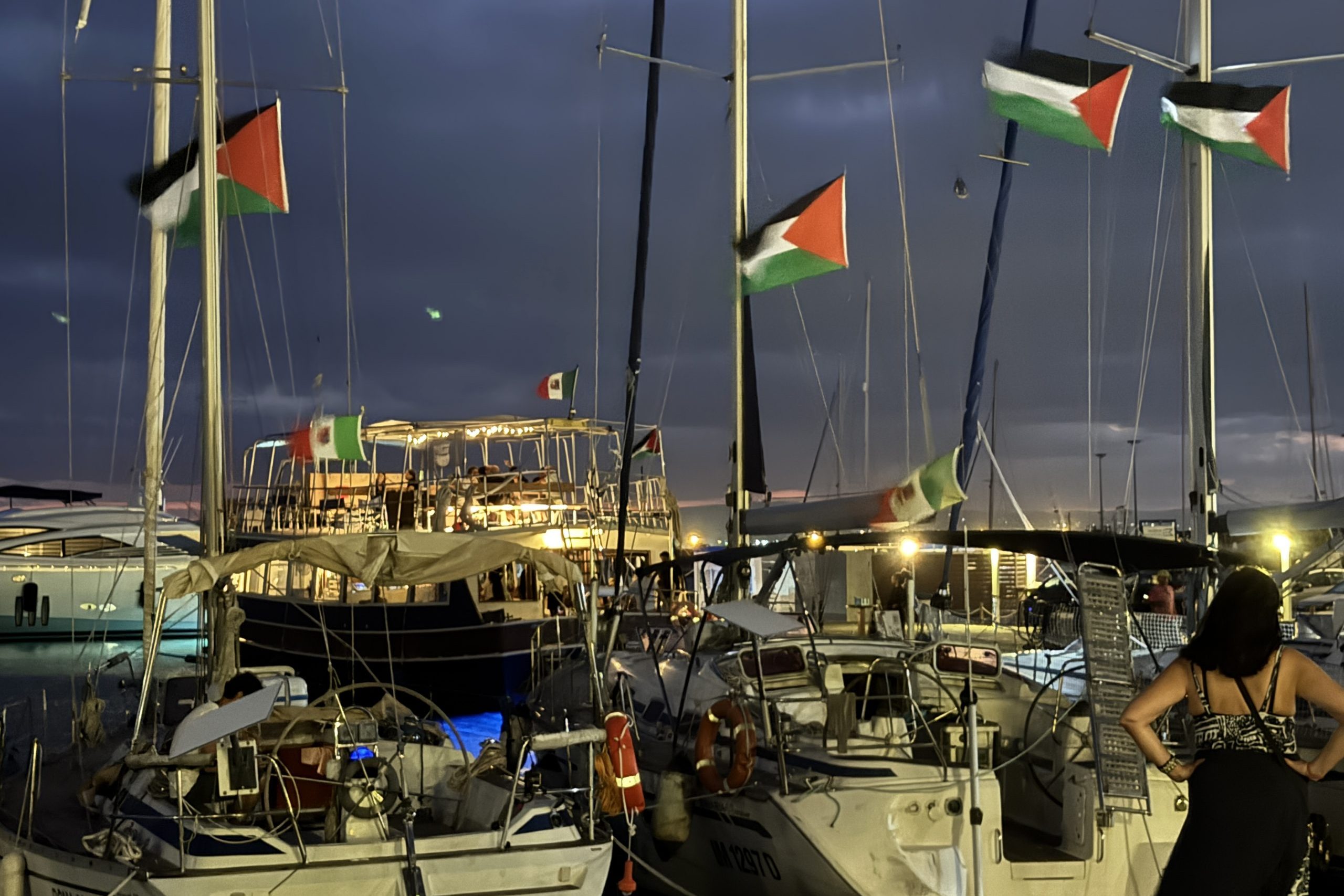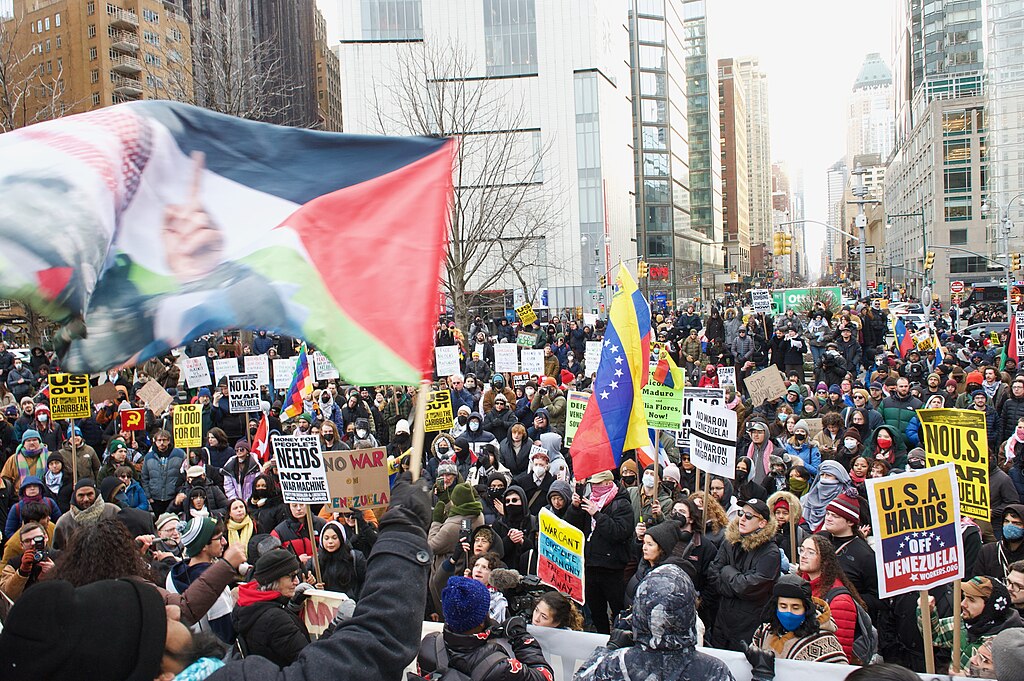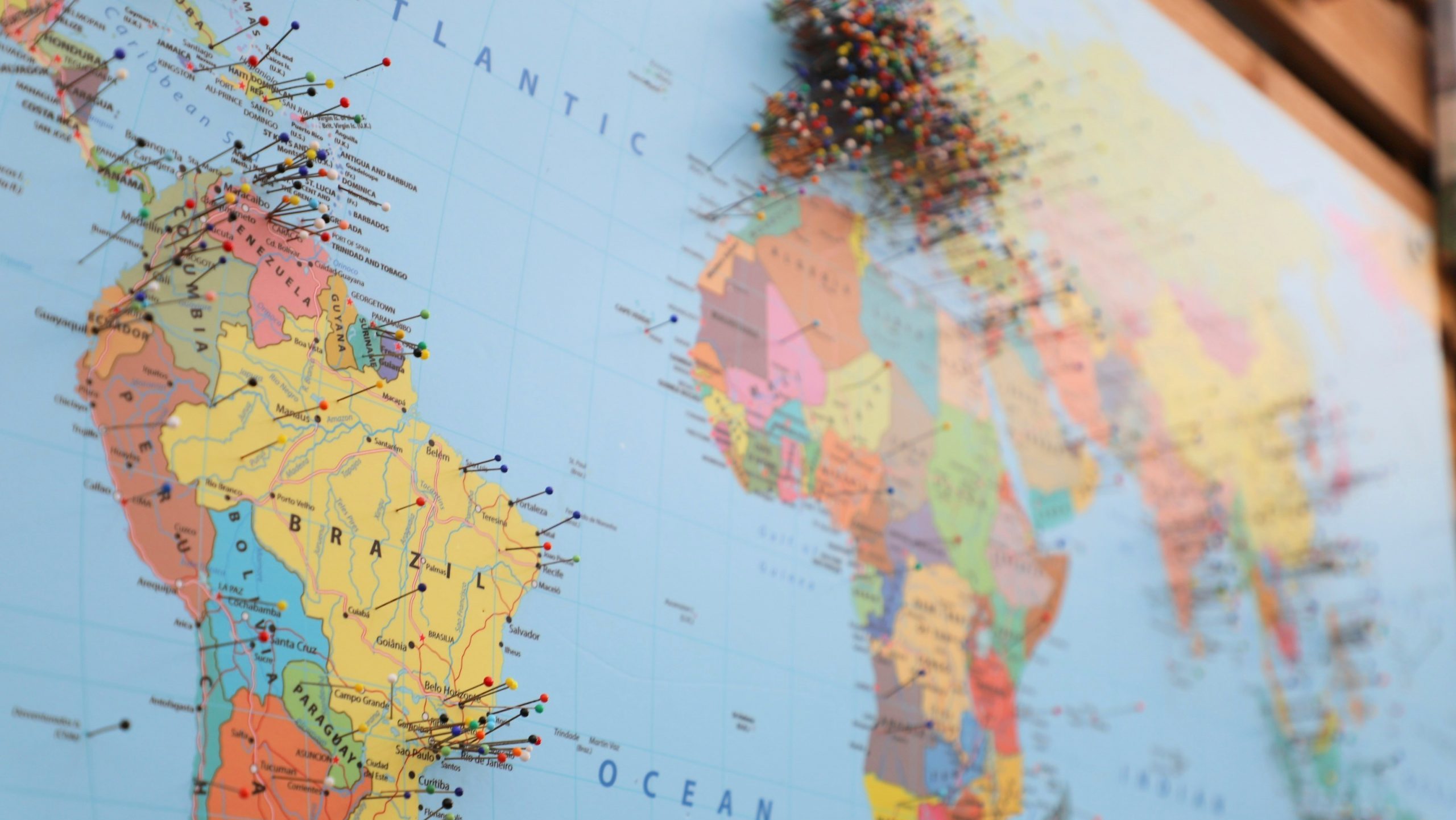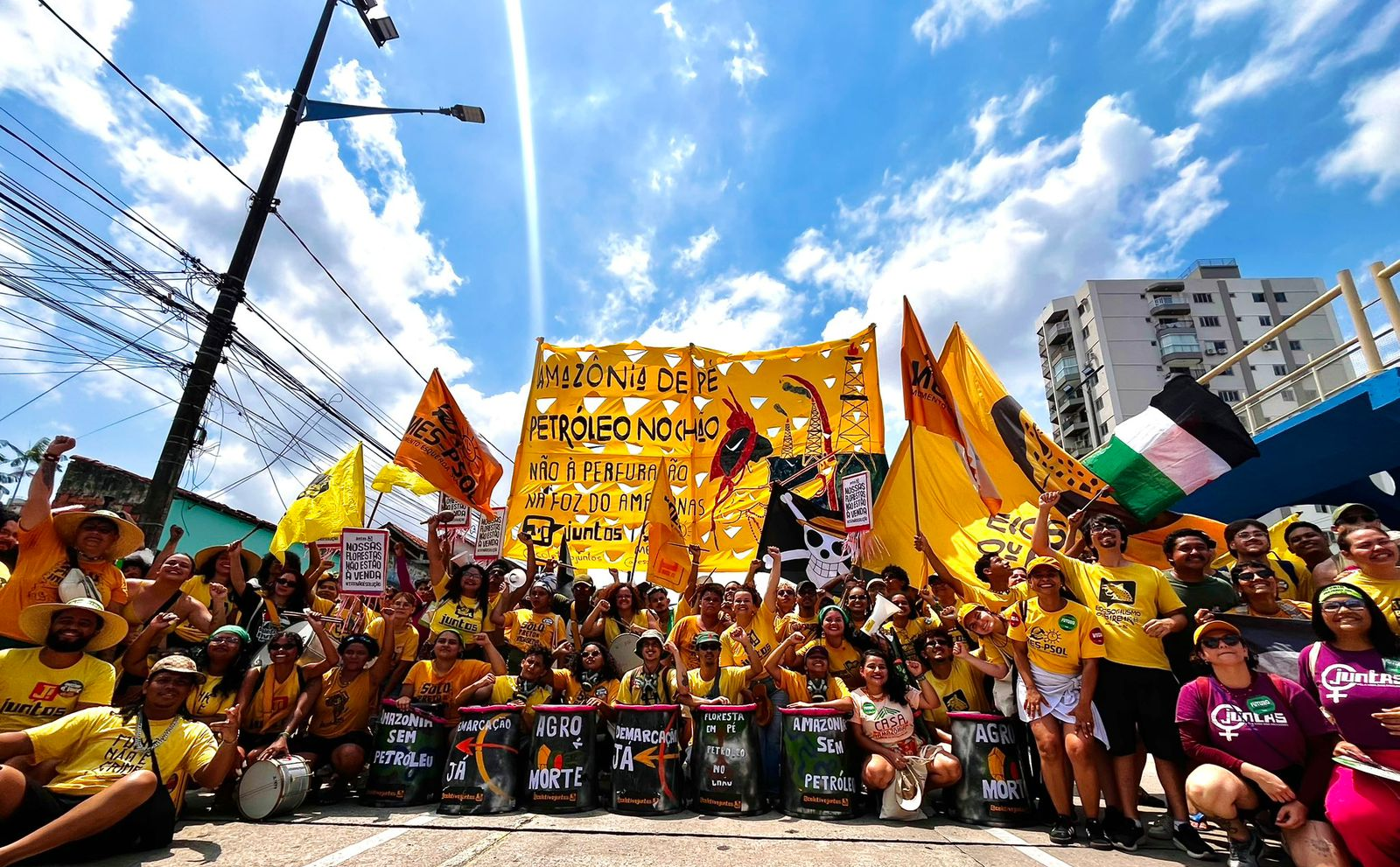Cyn Huang and Andrew Sebald interviewed Nico Calabrese about his participation in the Global Sumud Flotilla this fall. Calabrese is a physical education teacher from Argentina who has been living in Brazil for 10 years, teaching Spanish and active in a social movement (“Emancipa”) focused on popular education, helping working-class youth enter university. He is a member of Brazil’s PSOL, the Socialism and Liberty Party.
On August 31 the Global Sumud (Arabic for “resilience”) Flotilla launched from Barcelona with the goal of delivering food and medicine to Gaza. Israel had not only blockaded aid but had murdered innocent Gazans standing in line for it. Five hundred activists launched 44 vessels to break the siege. Israel intercepted the flotilla on October 2, brutally arresting its participants and deporting their members after hours of detention.
The Global Sumud Flotilla was not the first of its kind. The Freedom Flotilla had launched earlier in the year. Another mission sailed shortly after the Sumud Flotilla’s interception. But the Global Sumud Flotilla was different; it didn’t sail alone. Dockworkers in Genova, Italy, threatened to block shipments if they lost communication with the boats for 20 minutes. A general strike across Italy followed the day the flotilla was intercepted, with solidarity actions igniting the European left, and later movements all around the world. While they failed to save the flotilla in the end, popular pressure at home compelled Spain and Italy to send warships to protect it. The flotilla gathered millions of online visits during the climax of its passage. The moment illustrated a global, collective desire for the genocide in Gaza to end.
Nico Calabrese: There were almost 500 of us on the flotilla, representing 44 different countries, including Italy, France, Brazil, South Africa, Australia, Indonesia, and the United States, and notable activists like Greta Thunberg, Rima Hassan, and Thiago Ávila. But one of the most remarkable things is that 30,000 people registered to join. That’s an enormous number — 30,000 people willing to risk their lives for this mission.
For me, that number shows that people around the world are not indifferent anymore — they’re waking up. Despite the media siege that only shows Israel’s perspective, more and more people are learning the truth.
Cyn & Andrew: Can you tell us about the history of these flotilla missions? Why did organizers choose this tactic?
Nico Calabrese: What we’re doing is a continuation of many past efforts to break the siege that Israel imposes on Palestine. Since around 2007 or 2008, the blockade has been extremely tight. The first major attempt to break it was by land in 2009, but the Egyptian government refused to allow entry into Gaza from the south.
After that, people around the world who wanted to show solidarity with Palestine began looking for other ways. The sea became the best option, since you can sail through international waters without depending on another country’s permission.
Our initiative continues that legacy. When I arrived in Brazil, I met Yara, the only Brazilian on the 2010 flotilla that was attacked by the Israeli navy—an assault that killed ten people. In preparing for this year’s flotilla, we studied those past missions closely — learning from their experiences, their organization, and their courage.
This flotilla brings together four major organizations with different backgrounds and political views that have tried before to break the siege. This collaboration is a major step forward.
Cyn & Andrew: Why did you join the Flotilla?
Nico Calabrese: I used to work as a sailing instructor here in Brazil, teaching children how to sail. Through that, I gained a lot of maritime experience working with small boats and larger vessels.
Since around 2013 or 2014, I began to reflect more deeply on the injustices of capitalism and to learn about Palestine. I started reading about the ongoing genocide there—something that began long before 1948, even before the UN recognized Israel. For more than a decade, I kept asking myself what I could do to help. When I heard there would be another mission, I immediately knew I wanted to join.
I know this mission carries risks, but I’m willing to take them. Palestinian lives are treated as if they matter less, and I refuse to accept that.
Cyn & Andrew: Tell us about the journey from Spain to your interception.
Nico Calabrese: We spent eight or nine days preparing the boats — repairing, installing internet and cameras, setting up solar panels, and getting ready for the mission. Meeting so many people from around the world was a privilege. Some were experienced activists, others were joining a humanitarian mission for the first time. There were young people and even elders in their 60s and 70s offering their knowledge and skills. Those days built deep bonds — I’ll stay in touch with many of them for life.
When we left Barcelona, the weather was rough. We faced strong waves until reaching Tunisia, where we made our last stop. Two of our largest boats were attacked by Israeli drones and set on fire there — it was terrifying, but we decided to continue. Later, near Italy, rough weather forced us briefly into Sicilian waters. Between Italy and Greece, we suffered another attack — explosions and chemical substances burned our skin and eyes. Fourteen attacks hit twelve boats. It was frightening, but we stayed calm thanks to our nonviolence training.
After resting briefly in Greece, we continued toward Gaza. About 75 nautical miles offshore — far outside Israeli waters — we were intercepted. Around 10–12 Israeli naval boats surrounded us, using high-pressure water cannons. Soldiers armed with heavy weapons boarded our boat, shouting and threatening us. We followed our training, remaining peaceful and not responding to their aggression.
We were taken by force to the Israeli port of Ashdod, even though we never intended to enter Israel. For about 17 hours, we had no food, only some water and a few cookies. When we arrived, the soldiers beat and humiliated us — forcing us to look down, pushing and hitting us when we tried to speak or move.
Then they put us in a closed transport vehicle, our hands bound tightly with plastic ties and our eyes covered. We stayed there for hours in the heat, unable to breathe well, then freezing cold when they turned on the air conditioning. Some people fainted. We went about 30 hours without food, and many couldn’t even use the bathroom.
At the detention center, they separated us into small cells of eight to ten people. The only relief was being able to talk again and learn what had happened to others. For days we were held in harsh desert conditions — no showers, no outdoor time, barely any contact with the outside world. Our families and embassies didn’t know if we were alive. Eventually, we were allowed limited contact with diplomats, but it was clear we were being kept in near-total isolation.
Cyn & Andrew: What was the role of social media in your mission?
Nico Calabrese: Our mission wasn’t only to break the physical siege on Gaza by bringing humanitarian aid — food, water, medicine, and baby formula — but also to break the information siege.
It’s very hard to get the world to acknowledge Palestinians’ suffering. They’ve been recording the destruction of their homes and their people for years, but the world still doesn’t see it clearly because the major media outlets choose to show only the Israeli perspective. They rarely talk about the genocide against Palestinians, only about so-called “Israeli security” or “fighting terrorism.”
We wanted to show the world what was really happening — how a peaceful, legal humanitarian effort could be attacked and kidnapped simply for trying to deliver food and medicine. Social media became the main tool. I’m normally very private online, but this time I used it to make our mission visible.
Cyn & Andrew: Tell us about the role of internationalism.
Nico Calabrese: We’re taught to see ourselves as divided by nations — it’s everywhere, in politics, in the media, even in sports. We’re told “us versus them,” but that’s an illusion. The real division isn’t between countries; it’s between social classes.
That’s why it was so powerful to see over 30,000 people apply to join the flotilla. It showed that internationalism is alive — not only among socialists or political militants, but among ordinary people who feel solidarity across borders.
Cyn & Andrew: What do you think the Flotilla accomplished?
Nico Calabrese: We helped the world see what’s really happening. As Greta Thunberg said, “Now no one can say they didn’t know.”
Before this, the dominant narrative only showed Israel’s point of view. Now, many more people understand that Palestinians are suffering — and that this has nothing to do with “fighting terrorism.” Children are starving. It’s a humanitarian catastrophe.
The flotilla played a key role in strengthening global solidarity with Palestine. Even before it, support was growing. There were huge demonstrations around the world. The encampments that American students set up at universities inspired similar actions here in Brazil.
The kidnapping and violence we faced only made the injustice clearer. Israel wanted to expand its control and intensify the genocide, but global attention forced it to step back — at least for now.
Cyn & Andrew: We’re in a new moment after the negotiation of a ceasefire between Israel and Hamas. How do you understand this moment, and how can we keep up the fight?
Nico Calabrese: We can’t trust any so-called ceasefire. For decades, Israel has repeatedly violated past agreements. Even during this “ceasefire,” they continue killing Palestinians, so there’s zero trust. The genocide hasn’t stopped.
Still, the pause in the harshest forms of extermination, in particular the bombs, was a huge relief, and the release of nearly 2,000 Palestinian prisoners is an important step. Many had been held for 20 or more years without freedom, while only a small number of Israeli captives were freed. But true peace is not just about exchanging prisoners — it requires justice. The leaders responsible for genocide, like Netanyahu and his allies, must be tried for crimes against humanity. There can be no real peace without accountability.
The rebuilding of Gaza must also be led by Palestinians themselves, through genuine self-determination. Right now, reconstruction is being shaped by Israel, the U.S., and Arab monarchies to serve their own economic and political interests — not Palestinian freedom. Gaza’s future cannot be dictated by those who destroyed it.
A truly free Palestine must have its own independent government and leadership. Marwan Barghouti — often called the “Palestinian Mandela” — could play a key role in uniting the Palestinian people toward a peaceful, two-state solution. But he remains unjustly imprisoned.
There’s still a long way to go to achieve real freedom, justice, and peace for Palestine. Yet today, the world is more united with the Palestinian people than ever before.




